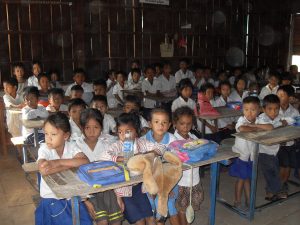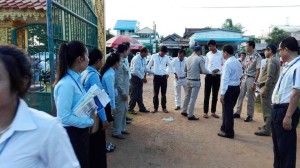Political Paradigm of Pragmatism from the Khmer Youth part 87

This part (87), Mr. Sophan analysed on Budget Plan 2017 sent by the government of Cambodia for approval from the parliament. As he focused on poor engagement and low budget allocation to the Ministry of Education, the bamboo shoots of future old bamboos is just a useful rhetoric for Cambodia. His recommendations has covered large topic of child development.
From now on, Cambodian children should be taken care and infused following indicators to ensure they are truly young bamboo seeds for old bamboos:
- Emotional maturity (ភាពចាស់ចិត្តចាស់គំនិត): students-centered pedagogy and allowing more space for children to play and learn from their own intuitive is better than to having teacher keep eyes on them as well as lead them in all time. Good teachers will teach students to seek knowledge by themselves by facilitating road-map for them. Schools of early childhood learning is exactly a playground. Children love to play, and they are grown up from such plays.
- Social competence(សមត្ថភាពសង្គម): working as a team is imperative to imply in this real world, not a dream world. Cambodian schools are good in helping students to walk alone into the uncertainty of their future. Many times, this model has failed students to incorporate with others in achieving common goals, and conflicts as well as violence has always happened in Cambodian society because of lacking team-building. Many world’s important days and holidays of the nation, are good in calendar and students are likely forced to memorize them. But in developed countries, pre-school students, kindergarten to grade 5, are involving with those days by different classroom activities such as drawing, visualizing, photo-copying, imagining, analyzing, and school tripping to those sites etc. It it normal to hearing students take turn to speak on microphone about the daily schedule and reporting news during each important session of schooling. It is normal to see students take care other students and helping them with traffic etc.
- Physical health and well-being(កាយពលនិងសុខមាលភាព): lacking nutrition and hygiene are one part, but school with no playground and community with no recreation center etc. are the most unaware by the government in bringing physical health, mental health, and well-being of the students.
- Communication skills and general knowledge(កំរិតទំនាក់ទំនងគ្នាល្អនិងចំណេះដឹងទូទៅ): my personal experience from grade 12 has been a live memo as I couldn’t communicate anything useful with the outside world at all. I cannot apply my knowledge from school with the real world at all. I asked myself that as I was a number one student in classroom on both math and literature made me shy, none-confrontational, avoiding, and unproductive at work like this or what?
- Language and cognitive development(ការអភិវឌ្ឍន៌ជំនាញភាសានិងបញ្ញាញាណ): in developed countries, students are encouraged to learn at least two languages. Many universities accept students with bilingual or multilingual only. Researches found ability to speak many languages assure students’ high competency.

